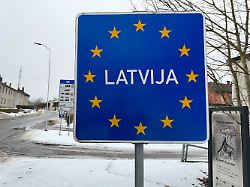Over 1000 people affected
Latvia expels Russians without residency rights
March 8, 2024, 2:00 p.m
As a result of the war of aggression against Ukraine, Latvia is changing its immigration law. Almost 500,000 people in the country belong to the minority of Russian origin. Some of them who do not comply with the new regulations begin to be systematically expelled from the country.
In Latvia, the first Russian citizens who no longer have a residence permit have been ordered to leave the country. According to the migration authority in Riga, six Russians have received a corresponding decision. Two of them had already left the country, said authority head Maira Roze on Latvian television. The other four now have to do this within 30 days. The background is changes to Latvia’s immigration law that were passed in autumn 2022 in response to Russia’s war of aggression against Ukraine.
Anyone who wants to continue living legally in Latvia with a Russian passport must now apply for permanent residence status and – with a few exceptions – prove that they have everyday knowledge of Latvian in a language test. People who have not provided proof in a timely manner and have not met the legal requirements for obtaining a residence permit must leave the Baltic EU and NATO country.
According to authorities, around 1,000 people are currently affected. According to available information, more than a fifth of them had already left Latvia via another EU state, said Roze. Almost two dozen other affected people cited family reasons for remaining in Latvia that could still be proven. For all others, the border guard will go to their last registered place of residence and check whether the person is there or not and, if necessary, order them to leave the country.
Latvia borders Russia to the east. In the Baltic state, the minority of Russian origin makes up around a quarter of the 1.9 million inhabitants. The majority are immigrants from the Soviet era and their descendants. Many of them – especially older people – are not Latvian citizens, but so-called non-citizens, others have a Russian passport.
